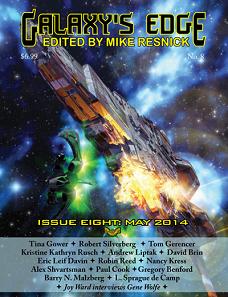 Galaxy’s Edge #8, May/June 2014
Galaxy’s Edge #8, May/June 2014
“Pocket Full of Mumbles” by Tina Gower
“Upright, Unlocked” by Tom Gerencer
“Fragmented” by Andrew Liptak
“Icarus at Noon” by Eric Leif Davin
“Air and Water” by Robin Reed
“Do You Remember Michael Jones?” by Nancy Kress
“Doubt” by Alex Shvartsman
Reviewed by Michelle Ristuccia
A well-rounded issue of Galaxy’s Edge with seven original stories covering wide subject matter, tone, and style.
“Pocket Full of Mumbles” by Tina Gower follows Maggie Mae as she attempts to decipher a particularly enigmatic ‘mumble,’ an abandoned spoken phrase that only deaf Maggie can sense and collect. Maggie’s discovery leads her to return the phrase in an emotional conclusion poignantly rendered by Gower. Readers will enjoy this tale from its engaging opening line onwards.
“Upright, Unlocked” by Tom Gerencer is an entertaining comedy that merges cynicism with the ridiculous when an all-powerful robot decides to bill Jerry, a nobody, for the creation of the world. Gerencer’s twisted thought-experiment-turned-story boasts a solid structure and a flare for the dramatic reminiscent of comedy SF classics.
“Fragmented” by Andrew Liptak describes a soldier’s reflections as his high-tech life-saving armor is dismantled in preparation for his return to civilian life. The narrative revolves around the soldier’s traumatic experiences and PTSD-type symptoms, without much exploration of the science behind the armor or the background of the war.
“Icarus at Noon” by Eric Leif Davin describes Santiago de la Cruz’s Icarus-like rebellion against the robotization of science and exploration. The action reflects the quiet desperation with which Santiago has previously faced the inevitable loss of his way of life. Although Santiago makes a bold move at the beginning of the story, in the end the story is more about fate – i.e., the larger forces of society and economics that shape our destinies.
“Air and Water” by Robin Reed is a coming-of-age story where human preteen Mara learns her true origins from alien owner and parent-figure Kekku. The two characters have a tenuous relationship based on a power play, where Kekku, as the owner, withholds information from Mara and physically restrains her from exploring the world on her own. The narrative’s admirably tight focus limits the reader to Mara’s perspective in order that we might empathize with her choice.
“Do You Remember Michael Jones?” by Nancy Kress slips into the paranormal with a side character who may or may not exist, but who has enigmatically affected the lives of the narrator and his graduation class. In contemplating Michael Jones, the narrator reevaluates his life and his recent divorce in ways that encourage the reader to question their own fickle memories.
“Doubt” by Alex Shvartsman follows the assassin known as the Raptor as he attempts to acquire the best in nano-technology from the shady Antey Corporation, a quest that soon bleeds into the bigger mysteries of his life and, by extension, his future. The challenges the Raptor faces force him to question how much he will allow his abilities and other people to control him, versus his humanity. “Doubt” engages the reader with driving action and semi-realistic science. While some may find the secret agent ploy a bit old hat, Shvartsman puts a twist on his assassin story by bringing in the question of otherness and humanity.
Michelle Ristuccia enjoys slowing down time in the middle of the night to read and review speculative fiction, because sleeping offspring are the best inspiration and motivation. You can find out more about her other writing projects and geeky obsessions by visiting her blog.